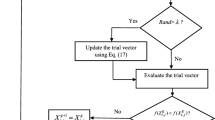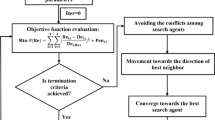Abstract
Over the past decade, several conventional optimization techniques had been developed for the optimization of complex water resources system. To overcome some of the drawbacks of conventional techniques, soft computing techniques were developed based on the principles of natural evolution. The major difference between the conventional optimization techniques and soft computing is that in the former case, the optimal solution is derived where as in the soft computing techniques, it is searched from a randomly generated population of possible solutions. The results of the evolutionary algorithm mainly depend on the randomly generated initial population that is arrived based on the probabilistic theory. Recent research findings proved that most of the water resources variables exhibit chaotic behavior, which is a projection depends upon the initial condition. In the present study, the chaos algorithm is coupled with evolutionary optimization algorithms such as genetic algorithm (GA) and differential evolution (DE) algorithm for generating the initial population and applied for maximizing the hydropower production from a reservoir. The results are then compared with conventional genetic algorithm and differential evolution algorithm. The results show that the chaotic differential evolution (CDE) algorithm performs better than other techniques in terms of total annual power production. This study also shows that the chaos algorithm has enriched the search of general optimization algorithm and thus may be used for optimizing complex non-linear water resources systems.







Similar content being viewed by others
References
Adeyemo J, Otieno F (2010) Differential evolution algorithm for solving multi-objective crop planning model. Agricultural Water Manag 97(6):848–856
Ahmed JA, Sarma AK (2005) Genetic Algorithm for Optimal Operating Policy of a Multipurpose Reservoir. Water Resour Manag 19(2):145–161
Arunkumar R, Jothiprakash V (2012) Optimal Reservoir Operation for Hydropower Generation using Non-linear Programming Model. Journal of The Institution of Engineers (India): Series A 93(2):111–120
Chang FJ, Chen L (1998) Real-coded genetic algorithm for rule-based flood control reservoir management. Water Resour Manag 12(3):185–198
Chang FJ, Chen L, Chang L (2005) Optimizing the reservoir operating rule curves by genetic algorithms. Hydrol Processes 19(11):2277–2289
Chen L (2003) Real Coded Genetic Algorithm Optimization of Long Term Reservoir Operation. JAWRA Journal of the American Water Resources Association 39(5):1157–1165
Cheng CT, Wang WC, Xu DM, Chau K (2008) Optimizing Hydropower Reservoir Operation Using Hybrid Genetic Algorithm and Chaos. Water Resour Manag 22(7):895–909
Deb K (2001) Multi-objective Optimization using Evolutionary Algorithm. John Wiley and Sons, Ltd.
Deb K, Agrawal RB (1995) Simulated Binary Crossover for Continuous Search Space. Complex Systems 9(2):115–148
Goldberg DE (1989) Genetic Algorithms in Search, Optimization and Machine Learning. Addison – Wesley, Reading, Mass.
Han F, Lu QS (2008) An improved chaos optimization algorithm and its application in the economic load dispatch problem. Int J Comput Math 85(6):969–982
Hınçal O, Altan-Sakarya AB, Metin Ger A (2010) Optimization of Multireservoir Systems by Genetic Algorithm. Water Resources Management 25(5):1465–1487
Huang X, Fang G, Gao Y, Dong Q (2010) Chaotic Optimal Operation of Hydropower Station with Ecology Consideration. Energy and Power Engineering 2(3):182–189
Jian-Xia C, Qiang H, Yi-min W (2005) Genetic Algorithms for Optimal Reservoir Dispatching. Water Resour Manag 19(4):321–331
Jothiprakash V, Shanthi G (2006) Single Reservoir Operating Policies Using Genetic Algorithm. Water Resour Manag 20:917–929
Jothiprakash V, Shanthi G (2009) Comparison of Policies Derived from Stochastic Dynamic Programming and Genetic Algorithm Models. Water Resour Manag 23:1563–1580
Karamouz M, Behzadian K, Zahraie B, Kerachian R (2004) An Evolutionary Model for Operation of Hydropower Reservoirs. World Water Congress 2003, ASCE, 1–10.
KHEP (2005) Koyna Hydro Electric Project Stage – IV, Irrigation Department, Government of Maharashtra.
KWDT (2010) Krishna Water Disputes Tribunal: The Report of the Krishna Water Disputes Tribunal with the Decision, Ministry of Water Resources. Government of India, New Delhi
Labadie JW (2004) Optimal operation of multi-reservoir systems: State-of-the-Art Review. J Water Resour Plan Manage ASCE 130(2):93–111
Li B, Jiang W (1998) Optimizing complex functions by chaos search. Cybern Syst 29(4):409–419
Louati MH, Benabdallah S, Lebdi F, Milutin D (2011) Application of a Genetic Algorithm for the Optimization of a Complex Reservoir System in Tunisia. Water Resources Management 25(10):2387–2404
Loucks DP, Stedinger JR, Haith DA (1981) Water Resources Systems Planning and Analysis. Prentice Hall Inc, Englewood Cliffs
May RM (1976) Simple mathematical models with very complicated dynamics. Nature 261:459–467
Pant M, Thangaraj R, Rani D, Abraham A, Srivastava D (2008) Estimation Using Differential Evolution for Optimal Crop Plan. Hybrid Artificial Intelligence Systems, Springer, LNAI 5271:289–297.
Price KV, Storn RM, Lampinen JA (2005) Differential Evolution - A Practical Approach to Global Optimization. Springer, Germany. ISBN 3-540-20950-6
Qin H, Zhou J, Lu Y, Li Y, Zhang Y (2010) Multi-objective Cultured Differential Evolution for Generating Optimal Trade-offs in Reservoir Flood Control Operation. Water Resour Manag 24(11):2611–2632
Raju KS, Nagesh Kumar D (2004) Irrigation planning using Genetic Algorithms. Water Resour Manag 18(2):163–176
Rani D, Moreira MM (2010) Simulation–Optimization Modelling: A Survey and Potential Application in Reservoir Systems Operation. Water Resour Manag 24(6):1107–1138
Regulwar DG, Choudhari SA, Anand Raj P (2010) Differential Evolution Algorithm with Application to Optimal Operation of Multipurpose Reservoir. Journal of Water Resource and Protection 2(6):560–568
Sharif M, Wardlaw R (2000) Multi-reservoir systems optimization using genetic algorithm: Case study. J Comp in Civ Engrg 14(4):255–263
Storn RM, Price KV (1995) Differential evolution-a simple and efficient adaptive scheme for global optimization over continuous spaces. International Computer Science Institute-Publications-TR-95-012.
Vasan A, Raju SK (2006) Application of Differential Evolution for Irrigation Planning: An Indian Case Study. Water Resour Manag 21(8):1393–1407
Wardlaw R, Bhaktikul K (2001) Application of a genetic algorithm for water allocation in an irrigation system. Irrig Drain 50(2):159–170
Wardlaw R, Sharif M (1999) Evaluation of genetic algorithms for optimal reservoir system operation. J Water Resour Plan Manage ASCE 125(1):25–33
Williams GP (1997) Chaos Theory Tamed. Joseph Henry Press, Washington, D.C
Wurbs R (1993) Reservoir-system simulation and optimization models. J Water Resour Plan Manage ASCE 119(4):455–472
Yeh W (1985) Reservoir Management and Operations Models: A State-of-the-Art Review. Water Resour Res 21(12):1797–1818
Yin L, Liu X (2009) Optimal Operation of Hydropower Station by Using an Improved DE Algorithm. Proceedings of the Second Symposium International Computer Science and Computational Technology(ISCSCT’09), 071-074.
Yuan X, Yuan Y, Zhang Y (2002) A hybrid chaotic genetic algorithm for short-term hydro system scheduling. Math Comput Simul 59(4):319–327
Yuan X, Zhang Y, Wang L, Yuan Y (2008) An enhanced differential evolution algorithm for daily optimal hydro generation scheduling. Computers & Mathematics with Applications 55(11):2458–2468
Yun R, Singh VP, Dong Z (2010) Long-Term Stochastic Reservoir Operation Using a Noisy Genetic Algorithm. Water Resour Manag 24(12):3159–3172
Acknowledgement
The financial support of Ministry of Water Resources, Government of India, New Delhi, through the Indian National Committee on Hydrology for this research work is gratefully acknowledged. The authors also thank Chief Engineer, Koyna Hydroelectric Project and Executive Engineer, Koyna Dam for providing necessary data.
Author information
Authors and Affiliations
Corresponding author
Rights and permissions
About this article
Cite this article
Jothiprakash, V., Arunkumar, R. Optimization of Hydropower Reservoir Using Evolutionary Algorithms Coupled with Chaos. Water Resour Manage 27, 1963–1979 (2013). https://doi.org/10.1007/s11269-013-0265-8
Received:
Accepted:
Published:
Issue Date:
DOI: https://doi.org/10.1007/s11269-013-0265-8




